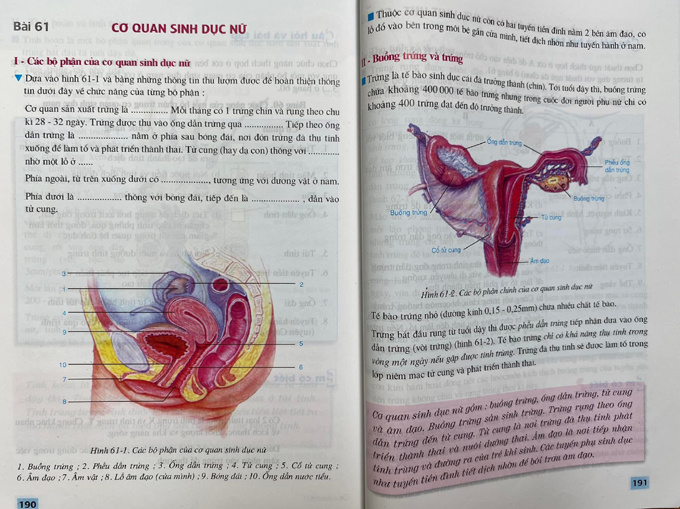Pham Thanh Nga, a ninth-grade student in a Hanoi public school, said she felt uncomfortable with her sex education class. The teachers weren’t comfortable, either, she added.
Nga said she was taught about male and female genital organs, fertilization, conception and contraceptive methods from her eighth-grade biology textbook. Reproduction was the last chapter.
“Since we are going through puberty, both girls and boys feel quite shy and awkward when learning about sex education. No one wants to talk about it,” she said.
She said sex education is never clear and specific in lower grades and students like her feel embarrassed on learning about it when they are coming of age.
Nga is among many students who find school-based sex education taught in a theoretical and technical way, instead of a friendly, comprehensive approach that makes it easier to learn. The classes make them feel “out of touch,” she said.
The students find that meaningful and open conversations about sex education are rarely held in a school setting.
Nga said teachers sometimes avoid discussing this “controversial” topic, and therefore, many students think sex education is not important.
“If we have questions, we discuss them with our close friends instead of asking questions in class.”
The current national sexuality education curriculum contains information this is not necessary and is irrelevant, said some teachers.
For instance, content dealing with taking care of pregnant mothers and babies is not necessary for fifth graders, Dao Thi Thu Huong, a teacher at the Da Ton Primary School, said, adding that the lessons should be replaced with those about self-care and how to prevent abuse.
Children are taught how to clean their bodies when they were in third grade. It was in the fifth grade that the first sex education lessons are introduced under civics and health sections, and as part of science lessons.
Fifth graders learn about reproduction, how the body is formed, what to do to keep both mother and baby healthy, puberty and hygiene during puberty, and others.
Huong said that some fifth-graders who have reached puberty are often embarrassed during sex education lessons.
“Sex education should be introduced earlier so that children are not embarrassed when they are in their teens. When they are equipped with knowledge and skills early, they will know how to protect themselves and actively prevent abuse,” she added.
According to Dr. Vu Thu Huong, former lecturer of Primary Education Department of Hanoi National University of Education, sex education programs were being neglected and being taught too late.
Meanwhile, the content is not relevant for students, she said.
Sex education in elementary school is integrated into science, while in middle school, it is part of eighth-grade biology curriculum.
Sex education should be taught separately and should have its own assessment test, she felt.
Other experts have also said that with children today hitting puberty early, introducing sex education for fifth or eighth-graders is too late.
Children abroad are taught at an early age, they have noted. Starting from preschool, children are taught how to wear underwear, protect themselves, clean private areas and prevent abuse. By the age of five, children learn about fetal formation, puberty, etc.
“Children who receive sex education early will be better prepared and know how to take care of their private areas and be able to detect any unusual problems sooner,” Huong said.
She said many schools today, especially private ones, were aware of the importance of sex education.
When they find that students watch porn, masturbate during nap time and have been abused by strangers, schools have stepped up extracurricular activities or regularly invited experts to share their experiences and talk to students.
She said: “Sex education is a broad topic that should not be taught only when students are in fifth or eighth grades. Other issues like LGBT rights and substance abuse also need to be taught at an early age.”
Sex education is also too academic.
Tran Thi Kim Anh, a long time biology teacher at the Nguyen Huy Tuong Secondary School in Hanoi’s Dong Anh District, said the sex education program was “very important and necessary” but not yet focused.
“The program is still too academic, forcing teachers to rely on experience to share with students,” Anh said.
 |
|
A chapter about female genitalia in an eighth-grade biology textbook. |
She said that while teaching the same chapter on reproduction, not all teachers have the ability to communicate, relate and help students acquire this knowledge.
Some new and young teachers avoid talking about this topic in depth because they are afraid, while married teachers will actively expand on it because they realize the importance of sex education.
Due to the limited content in the textbooks, she had to use other materials to make the lectures more engaging to her students, Anh said.
She wanted education companies and publishers to include more simulation videos and create more effective teaching materials.
- Reduce Hair Loss with PURA D’OR Gold Label Shampoo
- Castor Oil Has Made a “Huge” Difference With Hair and Brow Growth
- Excessive hair loss in men: Signs of illness that cannot be subjective
- Dịch Vụ SEO Website ở Los Angeles, CA: đưa trang web doanh nghiệp bạn lên top Google
- Nails Salon Sierra Madre
 VnExpress News The News Gateway of Vietnam
VnExpress News The News Gateway of Vietnam





